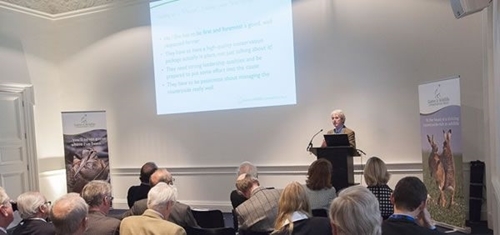
A SCHEME that sees farmers come together to nurture wildlife on their farms is being marked with a national conference at London’s Royal Geographical Society.
The Farmer Cluster concept, developed by the Game and Wildlife Conservation Trust (GWCT) in conjunction with Natural England, is a plan to help farmers work more cohesively together in their locality, enabling them to collectively deliver greater benefits for soil, water quality and wildlife at a landscape scale.
There are currently 49 Farmer Clusters across southern England and the upcoming conference, organised by GWCT and national education charity the Ernest Cook Trust (ECT), will see farmers, facilitators, advisors, policy makers and anyone concerned for wildlife conservation come together and share experiences.
Director of research at GWCT Nick Sotherton, who is chairing part of the conference, said: “We need to think about wildlife conservation on a landscape scale, not on farms.
“I don’t know a farm bird yet that gets to a boundary of a farm and stops – they don’t recognise farm boundaries. They recognise a landscape that has all the resources they need.
“There is currently farm support for environmental improvements, but what’s going to happen after Brexit? We are in very uncertain times.”
Speaking at the conference on Thursday, October 12 are staff from Natural England, the GWCT, including chief executive Teresa Dent, farmers and their advisers - all of whom will share their experiences on the day. Sir John Lawton will deliver the keynote address.
Talking ahead of the event, biodiversity advisor at the GWCT, Peter Thompson, said: “This conference will give those attending a fantastic opportunity to hear directly from those who have been involved in setting up and running landscape-scale Farmer Clusters – warts and all!
“Perhaps, most importantly, we will hear from farmers about what they feel works and what doesn’t. It will also provide a unique opportunity to mingle and share knowledge with a wide range of people involved in countryside management.”
Recently, the ECT awarded a grant to the GWCT to better understand how and why a Farmer Cluster works, involving a group of its own tenant farmers around the Fairford Estate in Gloucestershire.
Chief executive at ECT, Victoria Edwards, said: “We are delighted to be working in partnership with the GWCT on this innovative project. Collaboration and collective action are going to be so important for farmers in the coming years, and as a landowning Trust we are keen to do anything we can to encourage this.”
Tickets for the conference cost £45, which includes lunch and refreshments.
It runs from 10am to 3.45pm. You can book online below or contact Lynn Field on 01425 651025.
About the Farmer Cluster idea
Unlike existing environmental schemes for farms, which are top-down and involve much red tape, GWCT’s scheme is voluntary and led by the farmers themselves.
They decide what wildlife they would like to encourage and appoint a lead farmer. They choose their own conservation advisor and set their own targets.
In one example, the South Wiltshire Farmland Conservation Project brings together groups of farmers to improve wildlife numbers and habitat on 450 square miles of farmland around Cranborne Chase AONB.
This started as a project to protect vulnerable birds, and widened its remit to include other species of wildlife, as well as protecting soil and water. The scheme will benefit rare butterflies, including the marsh fritillary, as well as 19 species of bumblebee.
Notes to editors
The Game & Wildlife Conservation Trust – providing research-led conservation for a thriving countryside. The GWCT is an independent wildlife conservation charity which has carried out scientific research into Britain’s game and wildlife since the 1930s. We advise farmers and landowners on improving wildlife habitats. We employ 22 post-doctoral scientists and 50 other research staff with expertise in areas such as birds, insects, mammals, farming, fish and statistics. We undertake our own research as well as projects funded by contract and grant-aid from Government and private bodies. The Trust is also responsible for a number of Government Biodiversity Action Plan species and is lead partner for grey partridge and joint lead partner for brown hare and black grouse.
For information, contact:
Eleanor Williams
Telephone: 07592 025476
Email: press@gwct.org.uk